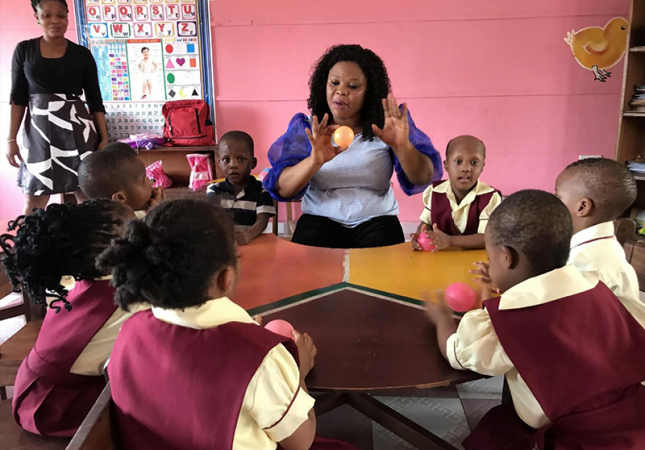
Precious Timothy teaches Montessori class color identification, March 9, 2021, at the Daughters of Charity of St. Vincent de Paul school of inclusive education in Uyo, Nigeria. Nigeria offers few schools for children with disabilities. (CNS photo/Valentine Iwenwanne)
By: Valentine Iwenwanne
UYO, Nigeria (CNS) — On a sunny afternoon, the Rev. Gideon Oyabugbe, a minister at a local Baptist church, walked into St. Vincent’s Centre for Inclusive Education to pick up James, his 8-year-old son. James has autism spectrum disorder, a condition that impairs communication and social interaction.
Rev. Oyabugbe had never heard about ASD until James was diagnosed with it as a baby.
“We noticed it from birth as he was growing up; he has not been able to speak, and sometimes he seems to hear, more like he has a partial hearing challenge. So we took him to the hospital, and the doctor said it could be a problem from the brain that is interpreting sounds, asking us to give him some time as he grows,” Rev. Oyabugbe told Catholic News Service.
So as James grew, his parents expected him to speak, but he could not. They knew the problem was as a result of his inability to hear, which also affects his speaking, and thought about getting him a hearing aid, but their family doctor advised against it.
Nigeria has few schools for children with disabilities, so many do not attend and face stigma and rejection. The country has the highest number of out-of-school children in the world, and absence of official data to determine the percentage of those with learning disabilities makes everything difficult, including establishing educational plans.
Part of the challenges children with special needs encounter stems from lack of awareness of learning disabilities coupled with teachers and parents who expect quick and miraculous solutions.
In a bid to address the challenge, a school of inclusive education run by the Daughters of Charity of St. Vincent de Paul ensures that children with disabilities enjoy full access to education with no exclusion on grounds of disability, language, gender, ethnicity or any other barrier.
Sisters Scholastica Achinkumbur and Victoria George currently teach at the center and specialize in special education. Twenty teachers and nine auxiliary staff deliver inclusive education to more than 100 students.
“The essence of establishing this school is to help children without disability coexist and break the myths and stigma surrounding their conditions,” Sister Achinkumbur, school administrator, told Catholic News Service.
She said children with disabilities also have the rights to live and exist in society without any limit to their basic rights, including rights to education. “So, if the children without disability are not exposed to inclusion, they may not be able to relate properly with those with disabilities,” Sister Achinkumbur told CNS.
In each of the classes, the sisters combine the pupils. This, Sister Achinkumbur said, will enable those with disabilities to learn faster and eliminate discrimination and communication barriers. The nuns and their staff teach the pupils total communication, which is the use of both words and sign language to speak.
“It’s not enough to talk with fingers alone,” said Sister Achinkumbur, noting all students are taught to write and to communicate in sign language. If all students “are not exposed to inclusions, they may not be able to relate properly with those with disabilities.”
“But because we have started in that manner with them, you’d see that they mix up very well, you won’t even see the difference, because they have been taught how to live with them,” Sister Achinkumbur told CNS.
To meet the needs of the pupils and ensure that those who are slow learners can keep up, the sisters put two teachers in each class together with student teachers from local universities.
Staffer Precious Timothy uses the Montessori pattern of teaching and playing to help the children learn quickly.
“When you are teaching a child, don’t just be the child’s teacher alone, be the child’s friend, the mom; with that, he’d get so close to you and you achieve what you want. So, for them to learn quickly, you’d need patience.” She told CNS it requires a lot of time and patience when teaching children numbers, “you can take them for a whole week; you emphasize on it each day, as we’re playing, they are learning numbers, shapes and colors.”
Children in primary 3, 4 and other classes have a unique way of greeting parents and visitors in sign language when they enter their classes: The class monitor beats the desk to get everybody’s attention, including those with hearing impairment, to enable them stand and greet visitors simultaneously.
The school also runs a program to help parents to communicate with the children at home. Rev. Oyabugbe rarely attends this program, so the school gave him a book to help him learn, and he has downloaded some visuals on the internet.
“Sometimes when (James) signs, I go on the internet to find out what he is saying and how to respond,” Rev. Oyabugbe told CNS. “And most times, his younger sister helps with interpretation,” because she, too, attends the inclusive school.